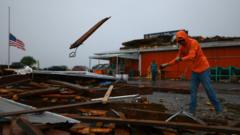FEMA (Federal Emergency Management Agency) has found itself at the center of a controversy following reports that a supervisor instructed staff to avoid homes with signs supporting former President Donald Trump while recovering from Hurricane Milton, which recently impacted Florida. The agency's administrator, Deanne Criswell, condemned the supervisor's actions as "reprehensible" and reaffirmed the agency’s commitment to neutrality in disaster assistance, emphasizing that it must assist all individuals regardless of their political affiliations.
While Criswell didn't provide specific details regarding the incident's timeline or location, Florida Governor Ron DeSantis has announced an investigation into what he deemed "targeted discrimination" against Trump supporters. The incident reportedly occurred in Lake Placid, where FEMA staff, engaged in damage assessments to determine eligibility for federal disaster aid, received internal communication relaying the discriminatory directive to "skip properties that had yard signs supporting the Republican candidate."
Criswell, in her public statement, insisted that such behavior would not be tolerated, pledging to ensure that such events do not happen in the future. This controversy has drawn attention at multiple governmental levels, with Congressman James Comer calling for testimony from Criswell before a House Oversight Committee. Additionally, Senator Josh Hawley has voiced support for possible prosecution of those involved.
The unwelcome publicity arises amidst ongoing efforts to assist Florida residents recovering from Hurricane Milton, which left millions without power and resulted in numerous fatalities. This incident illuminates the challenges FEMA faces in maintaining impartiality while working to rebuild communities impacted by devastating natural events. The controversy follows closely after Hurricane Helene, another severe storm that struck Florida, intensifying the scrutiny on the effectiveness and impartiality of disaster assistance moving forward.
As investigations continue, the tension between political affiliations and disaster response raises critical questions about how government agencies operate during emergencies and the ethical implications of such actions in real-time recovery situations.
While Criswell didn't provide specific details regarding the incident's timeline or location, Florida Governor Ron DeSantis has announced an investigation into what he deemed "targeted discrimination" against Trump supporters. The incident reportedly occurred in Lake Placid, where FEMA staff, engaged in damage assessments to determine eligibility for federal disaster aid, received internal communication relaying the discriminatory directive to "skip properties that had yard signs supporting the Republican candidate."
Criswell, in her public statement, insisted that such behavior would not be tolerated, pledging to ensure that such events do not happen in the future. This controversy has drawn attention at multiple governmental levels, with Congressman James Comer calling for testimony from Criswell before a House Oversight Committee. Additionally, Senator Josh Hawley has voiced support for possible prosecution of those involved.
The unwelcome publicity arises amidst ongoing efforts to assist Florida residents recovering from Hurricane Milton, which left millions without power and resulted in numerous fatalities. This incident illuminates the challenges FEMA faces in maintaining impartiality while working to rebuild communities impacted by devastating natural events. The controversy follows closely after Hurricane Helene, another severe storm that struck Florida, intensifying the scrutiny on the effectiveness and impartiality of disaster assistance moving forward.
As investigations continue, the tension between political affiliations and disaster response raises critical questions about how government agencies operate during emergencies and the ethical implications of such actions in real-time recovery situations.























